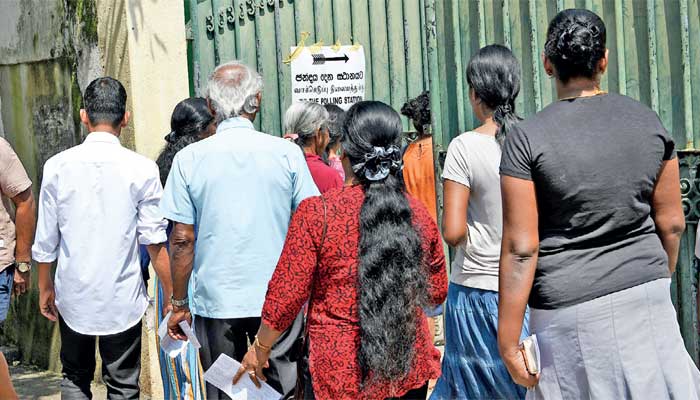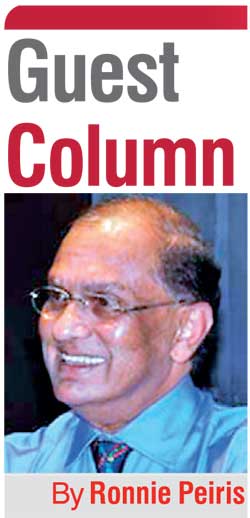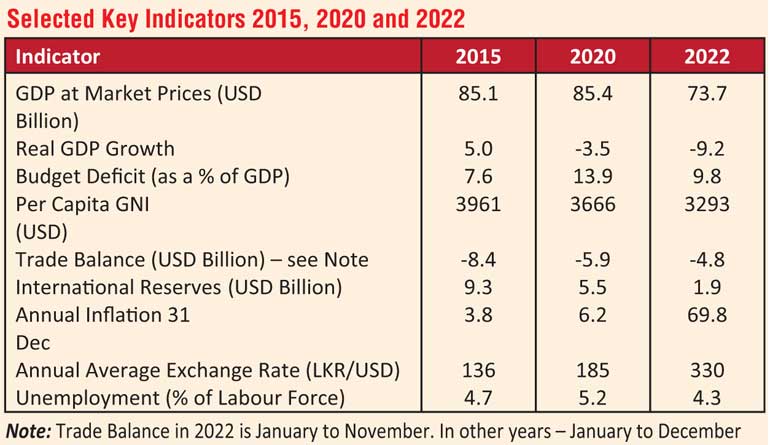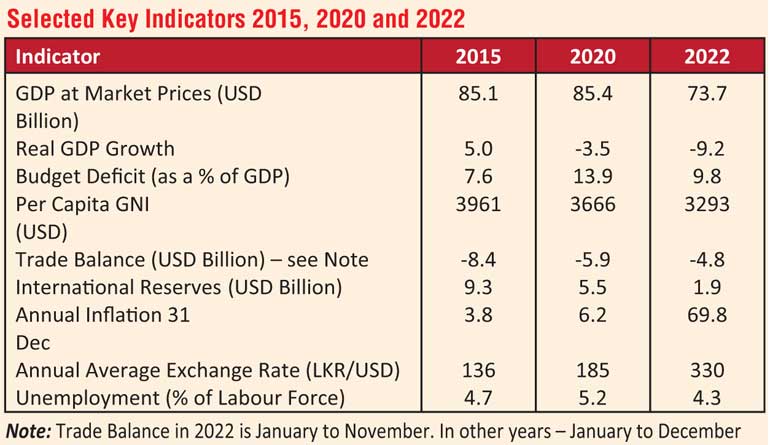Wednesday Feb 18, 2026
Wednesday Feb 18, 2026
Wednesday, 18 January 2023 00:14 - - {{hitsCtrl.values.hits}}

Our reticence in demanding performance and accountability, and our penchant for re-electing failed leaders appear to indicate that we are quick to reward non-accountability and non-performance – Pic by Shehan Gunasekara
|

The dismal failure of Sri Lanka’s citizens to hold their national leaders accountable is, in my view, the root cause of the country’s current economic and political woes. The mere fact that we, as if in a hypnotic trance, regularly re-elect persons who had, previously, abused their positions and mortgaged our country’s valuable resources to make merry today at the expense of tomorrow’s generations and the fact that there still exists a sizable number of citizens wanting the continuation and/or return of persons and parties who are clearly guilty of mismanaging our economy over several years, confirm that we, the voting citizens, do not understand the meaning of accountability and performance.
It is, therefore, not surprising that cunning politicians are exploiting the naivety and gullibility of the voting citizens in promoting their wares and extolling their virtues despite their appalling track records and abject failure in delivering promises. Accountability must be at the heart of a representative government because it, alone, provides the natural checks and balances on elected individuals keeping to the promises they make during an election campaign.
Talking of promises, and in driving home my point, let us, at a very high level, examine the election manifestos of the winners at the Presidential Election 2015, General Elections 2015, Presidential Election 2019, and General Elections 2020.
Presidential Elections – 2015
The electoral campaign of Maithripala Sirisena who was elected as the President in January 2015 under the banner of the National Democratic Front (NDF) consisting of the United National Party (UNP), Tamil National Alliance (TNA), the Janatha Vimukthi Peramuna (JVP), and about 40 civic action movements, pledged a democratic and corruption-free governance, the end of family rule and cronyism, and the re-establishment of the autonomy of key institutions of governance, in particular the legislature and the judiciary.
The electoral manifesto also contained a 100-day agenda, focused on reforming the presidency, abolishing the 18th Amendment, which made the office of the President extremely powerful, and changing the electoral system. With the prospect of an imminent parliamentary election, an Interim Budget 2015 crafted to gain electoral support for the United National Front for Good Governance was announced in the early days of the Sirisena presidency.
Among the most notable provisions, aimed at pursuing social justice were the raising of the living conditions of workers and the poor, the enhancing of the salaries of state sector public servants, the raising of pensions, the cutting of farmers’ loans by 50%, the cutting of taxes on 13 essential food items, the continuation of the agricultural fertiliser subsidy, and the raising of the education allocation to 6% of GDP. Perhaps, in congruence with social justice goals, additional taxes were imposed on the most profitable private companies, and the wealthy, in the forms of an annual Mansion Tax, a one-off 25% Super Gain Tax, a tax on casino business-owners, and a one-time tax on telecommunication providers and mobile phone operators.
General Elections – 2015
The five-point election manifesto of the United National Front for Good Governance, as presented by Ranil Wickremesinghe, in July 2015, as part of its General Elections Campaign 2015 centred around growing the economy, fighting corruption, ensuring freedom for all, investing in infrastructure, and improving the education system. In growing the economy, the stated goal was to create one million employment opportunities, establish various super development zones and bring about villages governed by the locals rather than politicians and officials. While the finalisation of a new Police Act, the formalisation of a Financial Crimes Investigations Division and the establishment of a University on Crime and Justice of Police were specifically mentioned in fighting corruption, the manifesto promised a new constitution in maximising the devolution of power under a singular state.
Reference was also made to transforming the Western Province into one mega city and the construction of 50,000 houses. In its vision to create a more educated and knowledge rich generation, plans included the opportunity for all children to receive a higher education notwithstanding their Ordinary Level Examination results, the prohibition of the use of teachers for tasks other than teaching and the allocation of 6% of GDP to the education sector.
Presidential Elections – 2019
The overarching thrust of Gotabaya Rajapaksa’s Presidential Election Campaign in 2019 was national security, anti-corruption measures, increasing productivity in a personal capacity, a people-centric economy, a technology-based society, maximising space for a smart and sustainable environment, a law-obedient society, and increased connection with rural economy. Amplifying his thoughts, he promised to restructure law and order institutions to expedite court proceedings, lower the cost of living, develop a knowledge-based economy, strengthen the training programs of nurses and teachers, modernise laws and regulations to encourage business start-ups and introduce a simple tax policy in attracting more investments and encouraging the public to pursue more economic activities.
He envisioned a tourism industry worth $ 10 billion. In agriculture, he promised the provision of fertiliser subsidies, the write off of debt incurred by farmers due to natural disasters and an encouragement of a move towards organic fertilisers. He promised to create one million jobs while in office and make Sri Lanka the premier business hub in South Asia. While pledging to eradicate drugs and corruption and empower women to earn through working from home, he said – quote: “I believe we do not want our policies to be written on papers, because the people of this country know that we will deliver on our promises. We will not give false hopes to the public.” – end quote.
General Elections – 2020
Campaigning on behalf of the Sri Lanka People’s Freedom Alliance, Mahinda Rajapaksa described his plans as a medium-term program of poverty alleviation and economic revival as envisaged within the “Vistas of Prosperity and Splendour,” the policy framework of the Government of Gotabaya Rajapaksa. The facilitation of a self-sufficient home grown economic and development strategy, minimisation of the disparities, and inequalities, in income levels between provinces, urban and rural communities, increase in exports and Foreign Direct Investment and a consistent tax policy were highlighted as his key goals.
Some specific mentions, amongst many others, were:
Promises fulfilled?
Whilst I leave it to the readers to assess the actual achievements of the relevant persons, and parties, against the above promises, to me, the verdict is a “Fail.” It is also crystal clear to me that the promises made were never meant to be fulfilled and they were craftily packaged to appeal to the short-term mindsets of the voting citizens of Sri Lanka in inducing them to vote for the campaigner. To me, it is shamefully obvious, in hindsight, that in the last three decades, we, the voters, have been taken on a ride, even when it was obvious to the voter that the vehicle we were travelling had hardly moved and/or was not moving.
“Stupid is Knowing the Truth, Seeing the Truth, but Still Believing the Lies.” (Author unknown). Whilst I agree that we must believe someone, or something, when looking to the future and electing our leaders and that we will only know the extent of achievement in retrospect, what confuses me most is, how we could put our faith in the same persons, and parties, who have not only failed to deliver the promises, but have run our country to ruin. The key underlying problem is that we, the citizens, are not holding our leaders accountable. We do not demand performance. There are, and there have been, no negative consequences to non-performance and a lack of accountability.
Further, our reticence in demanding performance and accountability, and our penchant for re-electing failed leaders appear to indicate that we are quick to reward non-accountability and non-performance. It is time we woke up from our stupor.
A quick scorecard
Selected Key Indicators
2015, 2020 and 2022
(Approx. – Indicative for illustration only)
The proof of the pudding is in the eating, it is said. Just a quick glance at some of the Key Indicators in 2015, 2020 and 2022 shows how badly we have regressed as a country. Whilst opinions may differ the above facts evidence the reality which we, as citizens, have encouraged through our silence.
No concomitant consequences of poor performance
As stated earlier, in our political arena there are no concomitant negative consequences for the culprit who performs poorly. In the private sector underperformers are dealt with swiftly and repeated underperformers are shown the door. However, in Government the “hire” and “fire” process in the private sector are replaced by a constitutionally dictated and thereby slower “elect” and “reject” process which must undergo closer scrutiny and vetting before it is enacted.
In such a setting offenders buy time and often return in glory. For example, we still have not held anyone responsible for the Bond Scam, the Sugar Scam, the Easter Day bombings, economic mismanagement, the misuse of project funding, reckless borrowing, the abuse of positional power, and the Lasantha Wickrematunge murder, just to name a few. Perpetrators, and masterminds, roam scot-free. Therefore, it is heart-warming that the Supreme Court of Sri Lanka found a former President and other leading public officials guilty of a dereliction of duties in not preventing the Easter bombings. This judgement immediately places all in Government and public service on judicial surveillance for accountability, performance, and failure to perform due to negligence.
Governments exist by the consent of the people
Being the eternal optimist, I am a believer that “Late” is never too late. While the past is behind us, the future beckons. We must adopt a different approach if we are to stem the tides of impending disaster. Democracies work best when the citizens of a nation hold their government accountable. As John Locke, the influential English political philosopher stated, “In democracies, the people must take responsibility for their Government, its actions, and its laws, because it is they, the people, who brought the political leaders into power.”
Expanding Locke’s thinking – a legitimate political Government is the result of a social contract where people in the state of nature conditionally transfer some of their rights to the Government in ensuring a stable, comfortable enjoyment of their lives, liberty, and property. Therefore, governments exist by the consent of the people. Taking the argument further, governments which do not protect the rights of the people and fail to promote public good must be resisted and replaced with a new government.
Although Locke appeared to favour rebellion in replacing governments, I would urge the voting public to do so only within the framework of the country’s constitution. This can happen, effectively, only if the citizenry is aware of their rights and knows when the Government is overstepping. To this end, it is essential that the more informed people voice their opinions more regularly and that more awareness engendering websites e.g., manthri.lk, and blogs, be propagated by using the connectivity power of social media. As Martin Luther King Junior said, “The ultimate tragedy is not the oppression and cruelty by the bad people but the silence over that by the good people.”
The Government must not, and must not be allowed to, pick and choose those parts of the constitution which best suit them at various moments of time. If the procedure dictated by the constitution was good enough in choosing a President, the same constitution must be good enough in determining the rights of citizens to express their views. If the constitution states that Local Government Elections must be held at a particular date, then they must be held. To allow “lack of money” smoke screens to postpone constitutionally enshrined rights is a step towards disaster.
Personally, I believe that local Governments are a waste of time. But that is a different argument. Extending the “consent of the people” dogma to public services, the question to pose is “for what purposes are public monies allocated and what is the actual role of a public service provider in the service of the population”? Public monies must be allocated for the right purposes, and they should be used wisely, efficiently, and productively in the name of the public interest. The political level must decide just what the greater good or public interest might be, and this should determine how citizens’ expectations are met.
|
In conclusion
In conclusion, let us pay heed to the words of Dr. Idah Pswarayi-Riddihough, World Bank Country Director for Sri Lanka and the Maldives, at the launch of the Handbook for Good Governance for Chairmen and Boards of Directors of Public Enterprises in April 2018; quote “Let’s start with the what. What does good governance require? It requires credible and trustworthy institutions built on principles of transparency and accountability. Accountability goes beyond the mere responsibility of delivery of a task or service. It also means answerability if a service is not delivered in a timely and efficient manner such that it becomes a burden. It is the citizens right but also their duty to demand it.” – end quote. ”Followers who tell the truth, and leaders who listen to it, are an unbeatable combination,” said Warren Bennis, the renowned American Consultant.”
So wake up Sri Lanka, demand accountability. It is our right.

